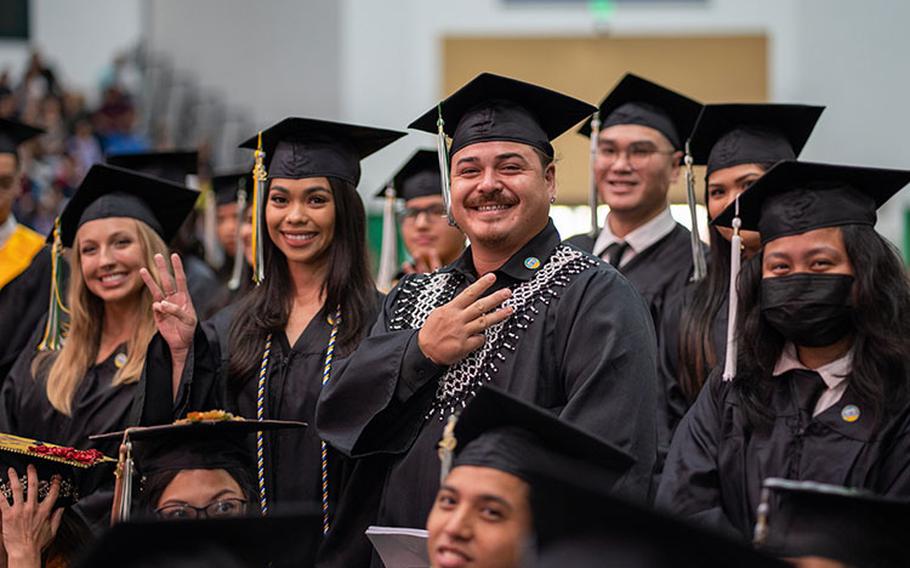Education
'Invest in our students': UOG submits $42M budget request, hoping to reverse years of decreased funding
Interim Communications Manager, University of Guam Marketing and Communications March 9, 2023

UOG graduates stand proudly during the University's Fanuchånan 2022 Commencement Ceremony on December 16, 2022. Photos courtesy of the University of Guam ()
The University of Guam has submitted its fiscal year (FY) 2024 budget request of $42 million for general operations — which includes student support services, personnel, facilities maintenance, and utilities.
“We are asking for what we need to stabilize the University,” said UOG President Thomas W. Krise. “With $42 million, we can recover from past funding shortfalls in critical areas of our operations, demonstrate to our accrediting bodies that the government of Guam supports UOG and its mission, and prove to our students that their success is worth our government’s investment.”
Since 2018, UOG has experienced a continued decrease in GovGuam funding for its operations. In FY2018, the Legislature appropriated $30.7 million. Five years later, in FY2023, the amount decreased to $23.6 million — UOG’s lowest in over 20 years. Appropriations from the Legislature have decreased 23% between 2018 and 2023. Adjusted for inflation, the decrease is closer to 35%.
REQUEST VS. APPROPRIATION FY2018 - FY2023
No Tuition Increases The University is not planning to increase tuition this fiscal year provided it receives the full appropriation of $42 million. Funding UOG at the requested level means the university won’t have to place an additional financial burden on students who, along with their families, are already coping with the higher cost of food, housing, and other basic needs.
“The Student Government Association has been working with UOG administration on keeping tuition costs the same for next year,” said SGA President Kyona Rivera. “We have assurances from UOG, but it’s up to our senators to adequately fund our University.”
Addressing Personnel Concerns A full appropriation in FY2024 will empower the University to address lingering personnel concerns including an outdated faculty pay scale and the deferred hiring of critical employees.
The budget request includes funding that will help UOG update its faculty salary scale which is over 10 years old. Recent pay increases for GDOE personnel have further put pressure on updating our faculty pay scale. For example, with both at Step 1 of their respective scales, an assistant professor earns $13,000 less than a GDOE teacher VI — and both positions require terminal degrees. Funding for an updated faculty pay scale will help UOG address other issues with the recruitment and retention of faculty.
Over the last five years, deferred hiring due to budget shortfalls has led to 77 critical vacancies in high areas of need including faculty, student services, and facilities maintenance. The budget request includes the funding necessary to fill these positions which will stabilize and improve UOG services and programs to benefit its students.
“We are missing key personnel, including faculty and support staff in many of our degree programs,” said Krise. “This means that our students often can’t get into the classes they need or the advisement they need, delaying degree completion and affecting our ability to retain students.”
The $42 million request also includes funding for a staff pay increase which will be needed should Bill 24-37 become public law.
Accreditation and ‘Maintenance of Effort’ For the first time in its history, the University has had an uninterrupted 16 years of accreditation from the WASC Senior College and University Commission. It received an eight-year term in 2009, which was renewed with commendations in 2016. The current term will end next year. The University is undergoing its accreditation review process and may be at risk for a period lower than eight years due to its decreased funding over the last five years.
“There is a focus on how a state government supports public higher education,” said Senior Vice President and Provost Anita Borja Enriquez. “The term is ‘maintenance of effort,’ and in the case of UOG, continual decreases in annual funding cause concern for accreditors.”
Enriquez, who also serves as a WASC Liaison and a member of accreditation review committees for other institutions, added that though UOG has been able to launch new programs such as a bachelor’s degree in civil engineering, and has improved student support services in advisement and counseling, a lack of operational funding limits what these programs can do and how much they can grow.
‘Investing in UOG makes economic sense’ GovGuam funding support for UOG ripples through the entire island community. According to an economic impact study conducted by the University in 2020, for every $1 it receives in general operations funding from GovGuam, UOG generates $3 in additional tax revenue for the government. The study also noted that UOG contributes $1 of every $17 in Guam’s economy. The study is available online.
“Investing in UOG makes economic sense,” said Krise. “I can’t think of any other university in the country or region that matters more to its community, to an economy, to a professional workforce, to the preservation and transmission of culture and language, than the University of Guam.”
Krise said $42 million next fiscal year is needed to stabilize operations and provide students with services and programs to help them succeed.
“Our faculty, staff, administrators, and our students have done everything we can to ensure our University survives — we need GovGuam to invest in our students,” added Krise. “Our students deserve better — they deserve our best.”